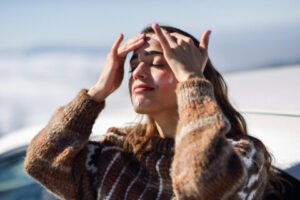Protect Against Skin Cancer with These Sun Safety Tips

Sun protection isn’t just for hot summer days. Harmful ultraviolet rays can affect your skin year-round, even when it’s cloudy or cold. Here’s how to protect yourself and reduce the risk of skin cancer.
- Wear sunscreen daily: Apply broad-spectrum sunscreen rated SPF 30 or higher every day, no matter the season. Rub it into all exposed areas, including easily overlooked places like your ears, neck, and hands. Reapply every two hours or after swimming, sweating, or toweling off.
- Protect your lips and scalp: Your lips and the top of your head are particularly vulnerable to sun damage. Use a sunscreen lip balm rated SPF 30 or higher. Then, wear a hat or apply sunscreen directly to exposed areas of your scalp.
- Choose the right clothing: Wearing protective clothing is an effective way to block UV rays. Opt for long sleeves, pants, and a wide-brimmed hat that covers your face and neck. Clothing with built-in UV protection is another great option. And don’t forget sunglasses with UV-blocking lenses to protect your eyes and the sensitive skin around them.
- Seek shade during peak hours: The sun’s rays are strongest between 10 am and 4 pm, so try to stay indoors or find shade during these hours. An umbrella is a practical source of shade if there are no trees or structures around to block the sun. Remember, UV rays can still reach your skin by bouncing off reflective surfaces like water, sand, and snow.
- Be mindful of windows: UV rays can pass through most windows, so you’re not entirely safe indoors or in the car. Use window screens that block UV rays or apply sunscreen if you’ll be sitting near windows for extended periods.
- Use extra caution at higher elevations: The sun’s rays become more intense the higher you are above sea level, meaning your skin will burn more easily. Be diligent about applying sunscreen and wearing protective clothing while outdoors at high altitudes.
- Avoid tanning beds: Like the sun, tanning beds emit harmful UVA radiation, increasing your risk of skin cancer. It’s best to avoid them altogether and embrace your natural skin tone. If you’re looking for a bronzed glow, consider sunless tanning lotion or spray instead.
- Check your medications: Some medications make your skin more sensitive to sunlight, increasing your risk of sunburn and long-term damage. If you’re taking antibiotics, acne medications, or antihistamines, check the bottle for warnings about UV sensitivity.
Visit Us for Skin Cancer Prevention and Treatment
In addition to the sun safety tips above, it’s also important to conduct self-checks and visit a dermatologist if you notice anything concerning. Swinyer Woseth Dermatology in Salt Lake City and South Jordan, UT, can help you maintain healthy skin year-round. Our experienced team offers both cosmetic and medical services, from routine skincare to skin cancer removal. To receive personalized tips or have a professional examine your skin for signs of cancer, please schedule an appointment with us today.
